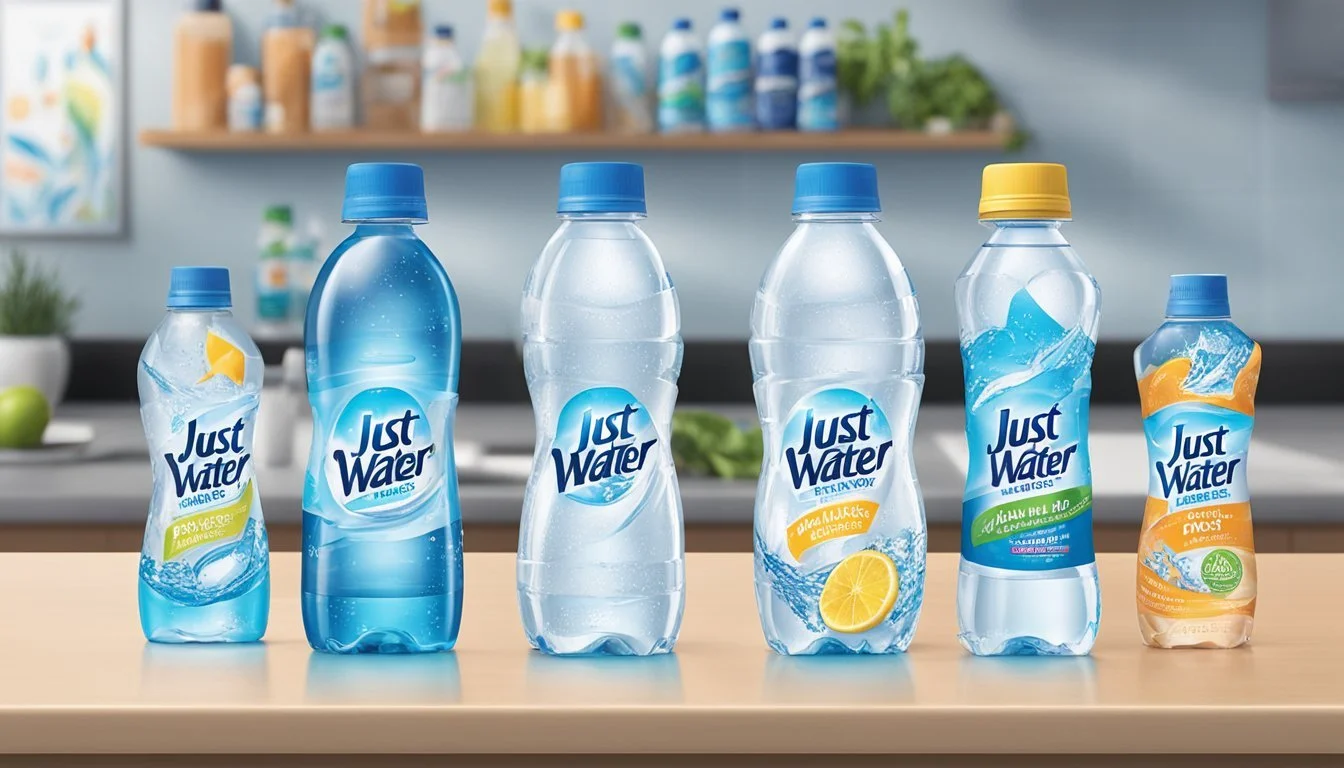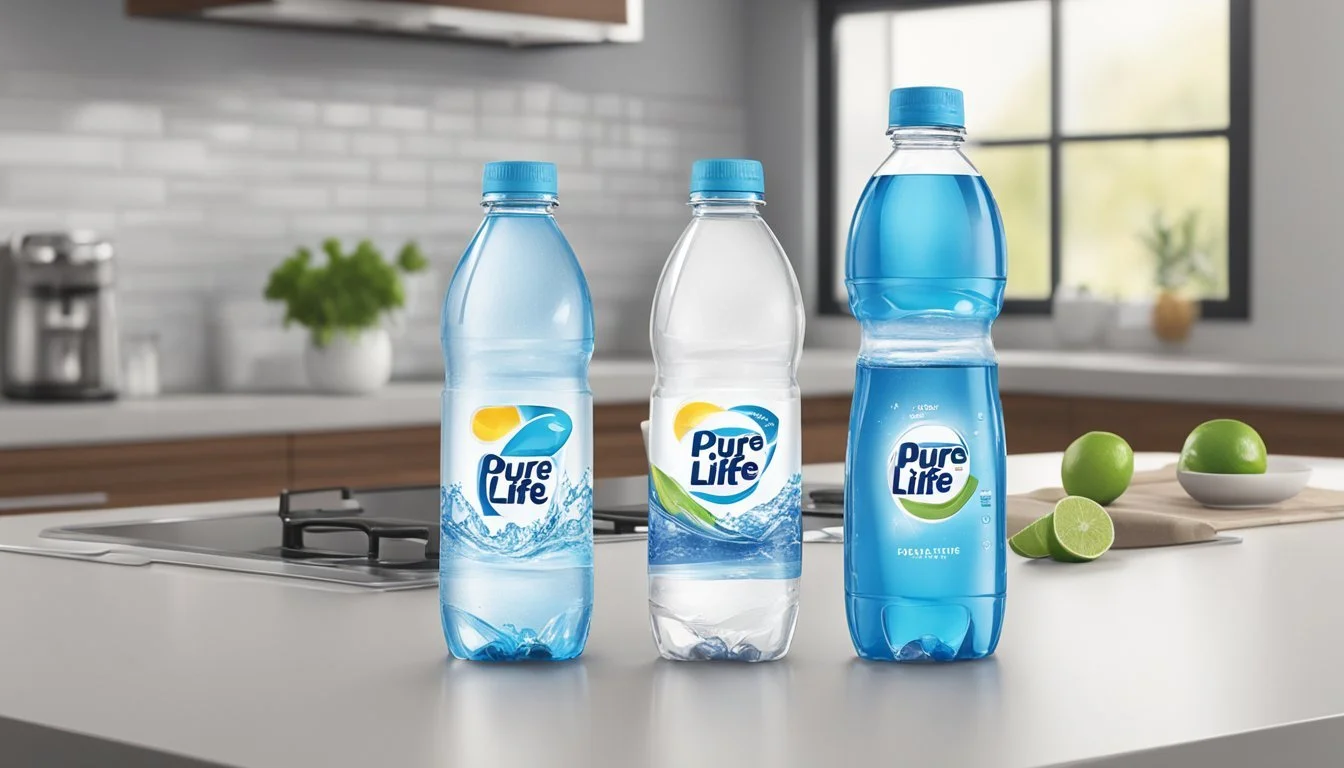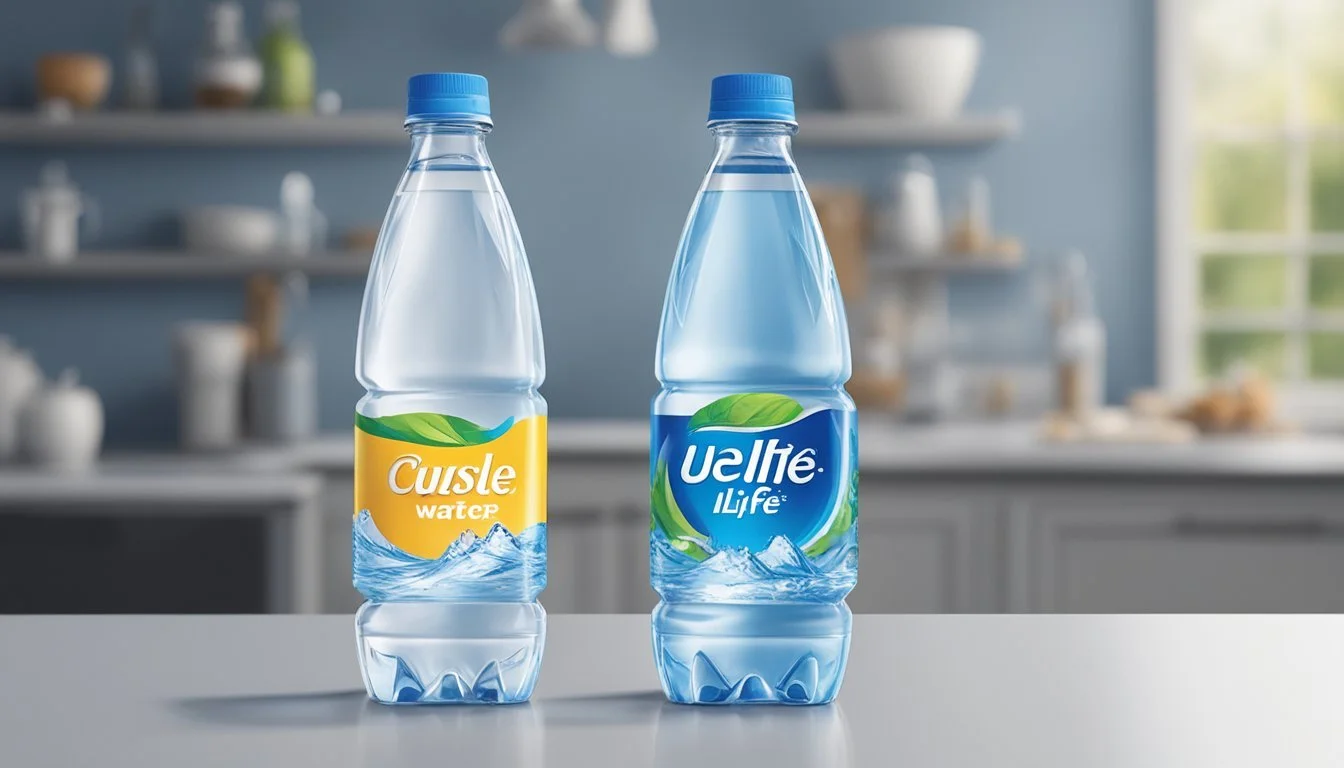Just Water vs. Nestlé Pure Life
A Comprehensive Comparison of Bottled Water Brands
The bottled water market is flooded with numerous brands, each touting their own benefits. Among them, Just Water and Nestlé Pure Life stand out for different reasons. Just Water prides itself on its eco-friendly packaging and naturally alkaline spring water, presenting a sustainable choice for consumers. Nestlé Pure Life, on the other hand, is a product of the world's largest food and beverage company, offering purified water with a unique mineral composition for taste.
Consumers often face the challenge of choosing between these two brands, with Just Water appealing to environmentally conscious buyers and Nestlé Pure Life attracting those looking for wide availability and affordability. The question of which bottled water is better is not just a matter of taste but also involves factors like sourcing, processing, packaging, and the overall environmental footprint.
Analyzing Just Water and Nestlé Pure Life involves more than comparing their taste and price points. It includes a discussion of the ethical sourcing of the water, the materials used in packaging, and the brands' commitment to environmental sustainability. The comparison is complex and multifaceted, reflecting the consumers' growing desire for products that not only serve their needs but also align with their values.
Just Water Overview
Just Water is a bottled water brand known for its strong environmental ethic and commitment to providing a sustainable alternative in the bottled water market. It stands out with a distinct approach to packaging and water sourcing, offering consumers a product that aligns with eco-friendly values.
Brand Philosophy
Just Water operates with the philosophy that access to clean drinking water is a basic human right and strives to offer a product that contributes positively to society and the environment. The company focuses on ethical sourcing and providing high-quality spring water while minimizing its environmental impact.
Environmental Commitment
The environmental impact of bottled water is a core concern for Just Water. It heavily invests in sustainable practices, such as using plant-based materials for its packaging. The cartons are made of 82% renewable resources, including paper derived from responsibly managed forests and sugarcane-based plastic caps which reduce carbon emissions and fossil fuels dependency.
Packaging materials: renewable resources
Carton composition: 52% paper, 28% plant-based plastic, 20% traditional plastic
Environmental goal: reduce carbon emissions
Product Range
Just Water offers a range of products, predominantly featuring 100% spring water. The spring water is responsibly sourced, ensuring that the local ecosystem is not disrupted. They provide plain water as well as infused flavors for variety. The product lineup includes:
100% Spring Water: The staple product, sourced with the community and sustainability in mind.
Infused Flavors: Options including lemon, tangerine, and apple cinnamon flavors, without artificial sweeteners.
By focusing on community, sustainability, and a product range that speaks to eco-conscious consumers, Just Water distinguishes itself in the crowded bottled and boxed water markets.
Nestlé Pure Life Overview
Nestlé Pure Life has established itself as a leading global water brand, offering various water products and holding a significant international market presence. Its commitment to quality and accessibility has made it a popular choice among consumers.
Brand Genesis
Nestlé Pure Life was introduced by Nestlé Waters, a subsidiary of Nestlé, which is the largest food and beverage company in the world. Launched in the 1990s, the brand’s inception was driven by Nestlé's commitment to providing accessible, safe, and quality bottled water. The water is sourced typically from municipal supplies, then undergoes rigorous filtration and purification processes to meet high safety standards set by entities like the International Bottled Water Association.
Product Varieties
Nestlé Pure Life offers a range of products to cater to varying consumer needs:
Still Water: The flagship product, purified still water available in different sizes.
Sparkling Water: Carbonated water with a hint of natural flavors for those who prefer a fizz.
Flavored Water: Water with added flavors for a tasteful twist.
The brand ensures that every bottle of Nestlé Pure Life water meets stringent quality checks, aiming to provide a healthy hydration option.
Global Presence
Nestlé Pure Life is recognized internationally, and its bottled water products are distributed across numerous countries. Nestlé leverages a comprehensive distribution network that allows the brand to have a strong market presence worldwide. The brand is known for its contribution to making purified bottled water accessible to a wide audience, consolidating its position as a key player in the global bottled water market.
Water Quality and Safety
When comparing Just Water and Nestlé Pure Life, it's essential to examine water quality and safety across several dimensions, including contaminant levels and the chemical composition that impacts hydration and taste.
Contaminant Examination
Just Water claims its product is responsibly sourced from a community watershed and boasts a 10-step quality process. They highlight their commitment to testing for heavy metals such as lead, as well as PFAS chemicals, BPA, and other contaminants to ensure clean water for consumers. On the other hand, Nestlé Pure Life is part of a larger portfolio of water brands; the brand emphasizes its multiple filtration processes, which include screening for arsenic and other potentially harmful contaminants, aligning with its sizable global presence.
Hydration Value
Hydration is a fundamental property of bottled water. Both Just Water and Nestlé Pure Life are designed to meet this need effectively. Just Water’s packaging, made primarily from paper from sustainably managed forests, seeks to offer a product that is both hydrating and eco-friendly. Nestlé Pure Life focuses on providing hydration through a product that meets safety standards and is readily available across various markets.
pH Levels and Acidity
The pH levels of bottled water can influence how the body interacts with it. Just Water reports a pH of 8, indicating it falls into the category of alkaline water, which some users prefer for its purported health benefits. Nestlé Pure Life's pH level typically hovers around neutral at 7, which can be better suited for those with sensitivity to acidity.
Taste Profile
Taste can be subjective but is also a reflection of water quality. Just Water touts a pure and crisp taste, which may be attributed to its mineral content and high pH level. Nestlé Pure Life, being purified through a multi-step process, aims to deliver a clean and refreshing taste that adheres to international standards, thereby maintaining a consistent flavor across its products.
Environmental and Health Impacts
The choice between Just Water and Nestlé Pure Life is more than a matter of taste—it's a decision that impacts the environment and potentially an individual's health due to the materials used in packaging and the overall carbon footprint of production.
Bottle Materials
Just Water prides itself on using a paper-based bottle with a plant-based cap, which is designed to reduce plastic usage. The company states that its bottle is approximately 82% renewable materials, a step towards environmental sustainability. In contrast, Nestlé Pure Life bottles are primarily made from plastic, which poses a greater environmental challenge in terms of waste and non-renewability.
Carbon Footprint
The production and distribution of bottled water by companies like Just Water and Nestlé Pure Life contribute to carbon emissions. However, the carbon footprint can vary significantly based on the materials used and the efficiency of the manufacturing process. Just Water claims a smaller carbon footprint due to its renewable materials and a responsible sourcing strategy. Nestlé, as part of Nestlé Waters and the International Bottled Water Association, has made efforts to improve the environmental profile of their production but still relies heavily on traditional plastic bottles.
Health Concerns Related to Packaging
Bottled water brands must ensure their packaging is safe and does not leach chemicals into the water. BPA (Bisphenol A) has been a concern in some plastic products; however, both Just Water and Nestlé Pure Life offer BPA-free packaging. It is crucial to consider that even BPA-free plastics can contain other potentially harmful substances, although the International Bottled Water Association monitors member compliance with quality standards.
While the health impacts of microplastics found in bottled water are still under investigation, they have been found in many brands, including Nestlé Pure Life. Just Water's emphasis on paper materials may sidestep some concerns associated with the leaching of plastic-based compounds into the water product.
Consumer Experience
When comparing Just Water with Nestlé Pure Life, consumers gauge their experience based on convenience, brand loyalty, and marketing strategies. These factors impact their choice of bottled water.
Convenience
Just Water touts its eco-friendly packaging and commitment to sustainability as a unique selling point, which appeals to environmentally conscious consumers. The brand's carton design is also intended to be more portable and user-friendly. On the other hand, Nestlé Pure Life is available in a variety of sizes, from small bottles to large multi-gallon containers, making it a convenient option for a wide range of needs. Nestlé's extensive distribution network ensures that their water brand is readily available in many retail outlets, enhancing the convenience for the customer.
Brand Loyalty
Brand loyalty significantly influences consumer choices. Nestlé, with its diverse product portfolio including Nestlé Pure Life, Perrier, and Poland Spring, has established a strong presence in the water market alongside names like Fiji, Dasani, and Aquafina. Nestlé's long history and widespread recognition contribute to solid brand loyalty. Just Water has cultivated brand loyalty through its commitment to sustainability and by aligning with ethical consumption values, creating a dedicated customer base that appreciates the brand's environmental initiatives.
Marketing Strategies
The marketing strategies of Just Water and Nestlé Pure Life differ considerably. Just Water leverages its environmentally responsible image with campaigns centered around sustainability and ethical sourcing, which may not only attract but also retain customers who prioritize those values. Nestlé Pure Life, while also highlighting health and well-being in its marketing efforts, has a more traditional approach that emphasizes the purity and safety of its water. Both brands employ strategic marketing to establish a competitive advantage, but their tactics are tailored to resonate with their respective target markets.
Comparative Analysis
In comparing Just Water and Nestlé Pure Life, the analysis will focus on two key area: how they stack up in terms of price and how accessible these products are to consumers.
Price Point
Just Water is often seen as a premium product, boasting eco-friendly packaging and a commitment to sustainability. Its price reflects these premium qualities. In comparison, Nestlé Pure Life, which is positioned as an everyday hydration solution, typically comes at a lower cost. Just Water can be more expensive than Nestlé Pure Life per bottle, depending on the retailer.
Just Water (500ml): Approximately $1.29 - $1.99
Nestlé Pure Life (500ml): Approximately $0.20 - $1.00
Availability
Nestlé Pure Life, being part of Nestlé's global brand, benefits from an extensive distribution network and is widely available in most supermarkets, convenience stores, and vending machines. It is one of the most accessible bottled water brands worldwide.
On the other hand, Just Water, while rapidly growing, may not be as ubiquitous as Nestlé Pure Life. They are commonly found in health food stores, select supermarkets, and online platforms. The availability often depends on the region and retailer, but the brand has been expanding its presence in the market.
Just Water: Select stores and online
Nestlé Pure Life: Supermarkets, convenience stores, vending machines worldwide
Expert and Customer Reviews
In comparing Just Water and Nestlé Pure Life, industry experts weigh in with informed critiques, while consumer feedback provides insights into user experiences.
Critiques by Industry Experts
Experts in the field, such as investigative journalists and members associated with the International Bottled Water Association, tend to analyze bottled water brands based on factors like source quality, taste, and sustainability practices. Just Water is often lauded for its eco-friendly packaging and ethical sourcing, with a focus on reducing carbon footprint. Industry specialists underscore its spring water's clean taste and the company's transparency.
On the other hand, Nestlé Pure Life, despite being one of the most recognized brands, receives more mixed reviews from experts. It is noted for its wide availability and extensive purification process, but it has also been subject to criticism relating to environmental impact and water sourcing practices.
Consumer Ratings and Testimonials
When it comes to consumer feedback:
Just Water
Average Rating: 4.5/5 based on major online retail platforms.
Testimonials highlight the fresh taste and commend the company for its environmental responsibility.
Nestlé Pure Life
Average Rating: 3.5/5 across various consumer sites.
Testimonials frequently mention the brand's reliability and affordability, though some express concerns about taste and plastic waste.
Final Recommendations
When selecting between Just Water and Nestlé Pure Life for your bottled water choice, consider the following aspects:
Source and Filtration: Just Water prides itself on using spring water from the Adirondack Mountains and boasts of its Hydro-7™ filtration process, designed to maintain purity and taste. Nestlé Pure Life, on the other hand, is purified water that undergoes a multi-step process, including reverse osmosis.
Packaging and Environmental Impact: Just Water uses a paper-based bottle with a plant-based cap, which they claim is 82% renewable. Nestlé Pure Life bottles are primarily plastic but the company has committed to making its bottles from 100% recycled materials.
Taste and Quality: Taste is subjective, but Just Water often receives praise for its clean taste with a high pH level, potentially offering a smooth and refreshing experience. Nestlé Pure Life is a well-recognized brand noted for consistent quality and a clean taste, though opinions on flavor can vary.
Price Point: Just Water is typically marketed as a premium product with a price reflecting that stance. Nestlé Pure Life is more widely available and often priced competitively, making it a budget-friendly option.
Added Minerals: Nestlé Pure Life includes a blend of minerals added for taste. While not a significant source of electrolytes, like specialized waters such as Smartwater or Essentia, these can affect the flavor profile.
The choice between Just Water and Nestlé Pure Life should be guided by individual priorities including environmental impact, taste preference, and budget. It's also beneficial to consider the role of bottled water in one's overall hydration strategy, potentially exploring other brands like Core Hydration, Evian, Voss, or electrolyte-enhanced offerings.





